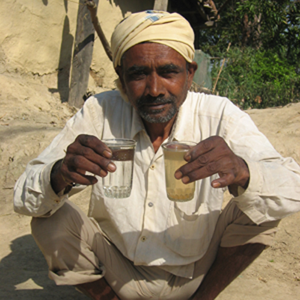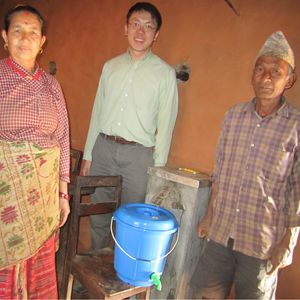
and without KAF.

The Kanchan Arsenic Filter (KAF) was developed at MIT in 2002 by graduate student Tommy Ngai under the direction of Susan Murcott '90, SM '92, senior lecturer in civil and environmental engineering. The KAF is a low-cost household water filter for the developing world that removes arsenic and other harmful particles from treated water.
How did you get started, and how has your work evolved?
MIT provides outstanding training and education to engineers to tackle the world’s problems, and I believe the skills learned at MIT should be used to serve the world’s poor. I started with a research project at Susan Murcott’s lab as part of my master of engineering, where I worked to test and improve water treatment technologies. By synthesizing different ideas, I came up with the Kanchan Arsenic Filter design, which was awarded funding through the MIT IDEAS Competition [now IDEAS Global Challenge] and subsequently the World Bank, Finnish International Development Agency, St. Andrews Award for the Environment, UN-Habitat, Centre for Affordable Water and Sanitation Technology, Asian Development Bank, Reed Elsevier, and many other agencies for further research, development and implementation.
What impact have you achieved on the communities you served?
Our 20,000 filters in Nepal have served about 100,000 people, mostly in rural villages. We're currently working with the Institute of Technology of Cambodia to modify the filter design for Cambodian use, and we're currently working with the University of Illinois to test virus removal of a modified version of the filter in Nepal.
How has this work had a personal impact on you?
My career in international development started with the Kanchan Filter. I am now firmly in the international development and water and sanitation field, holding the position of Director of Research Learning at CAWST (Centre for Affordable Water and Sanitation Technology), a leading water and sanitation NGO. Several years ago I went to University of Cambridge (UK) to do my PhD on how NGOs can improve their implementation strategies to increase the impact and sustainability of their water programs, especially in the management of water filters like the Kanchan Arsenic Filter. Without the PSC, I may have never been able to pursue my interest and start a career in international development.

